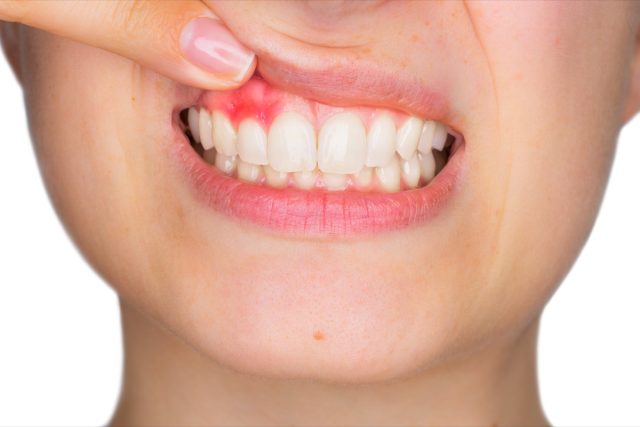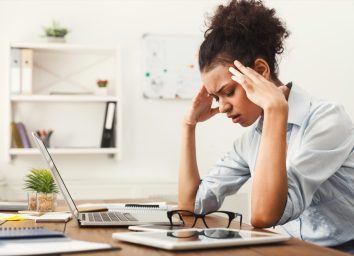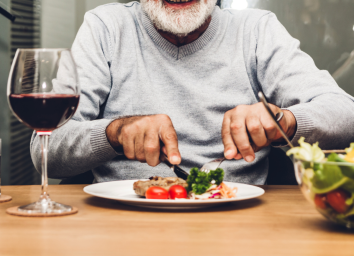6 Signs Your Eating Habits Are Unhealthy, Say Dietitians

With research and guidance continually evolving (and sometimes contradicting itself), it’s pretty tough to keep up with what’s considered healthy these days. That means no matter how hard you try to eat well, you may accidentally be making poor decisions when it comes to your diet.
The good news? Experts say there are some telltale signs you can look out for that suggest your eating habits are unhealthy. By keeping an eye out for these red flags, you can then build awareness around what habits need to be changed for the sake of your overall well-being.
“Contrary to popular belief, a nourishing diet consists of all kinds of food,” says Janine LaForte, RD and founder of Real Life Nutrition. “To sustain a healthy lifestyle, our bodies need food for both nourishment and for pleasure. So, if you’re striving for perfection, chasing the next big nutrition trend, or restricting certain foods, you may want to reconsider your eating habits. Ultimately, we should all be striving for balance and moderation, and learning to listen to our body’s cues. A gentle and realistic approach like this allows for enjoyment and satisfaction in eating, which makes it simple to maintain.”
In other words, you don’t necessarily have to give up on those foods you love to stay healthy. You should, however, look out for the following signals that it’s time to make a change.
You have poor oral health.

Did you know that your oral health can actually offer insight into the quality of your diet? According to Cheryl Mussatto, MS, RD, author of The Nourished Brain, bleeding gums and cavities are not only due to a lack of flossing and brushing, but they can also be signs that your eating habits aren’t great.
“Swollen or bleeding gums are associated with not eating enough vitamin C-rich foods like citrus fruits, tomatoes, and leafy greens,” she explains. “And too many sugary beverages or foods are often linked to cavities and inflammation.”
You always get hungry again before bedtime.

Let’s be clear: it’s normal to occasionally need a little snack a few hours after dinner. But if you constantly find yourself feeling hunger pangs late at night—even after eating a balanced dinner—that may mean you’re not taking in enough calories, or meeting your needs for certain macronutrients, says Kitty Broihier, MS, RD, owner of NutriComm consulting and creator of the Eating Habits Lab.
“Lots of refined carbohydrates and little protein is a recipe for hunger later on, as these components help keep us feeling full,” she adds. “Eating enough food throughout the day, including enough protein and fiber, should keep evening snacking in check. If you find yourself routinely reaching for snacks an hour or two after dinner, look at the patterns of your food intake.”
You’re regularly constipated.

“While there can be many reasons or causes for constipation, most people are not getting enough fiber in their diet, which can contribute to this problem or make it worse,” says Christina Iaboni, RD. “Fiber is found in fruits, vegetables, beans, and whole grains.”
If you think you aren’t getting enough fiber, Iaboni suggests adding more fiber-rich foods into your diet slowly and gradually to reduce the risk of unpleasant side effects like gas and bloating—for example, you might start by adding some whole-grain cereal to your yogurt in the morning, or having a serving of vegetables on the side at lunchtime.
You’re tired or fatigued a lot.

Do you feel super lethargic most days? Having trouble mustering up the energy to exercise, or even just complete basic daily tasks, like running errands? Experts say there’s a good chance you may have low blood sugar.
To prevent this, Iaboni advises trying to eat something every three to four hours, making sure to include a combination of protein and carbohydrates in each snack or meal. Some examples of this combo include an apple with almonds, carrots with hummus, whole-grain toast with an egg, or whole-grain crackers with peanut butter.
Broihier notes that it can be helpful to keep a stash of healthy snacks on hand at your desk, in your car, or in your bag.
“Having a nutritious snack available, and spreading calories out more evenly through the day can help prevent that ravenous, I-could-eat-every-carb-in-sight feeling,” she adds.
If eating more regularly throughout the day doesn’t help, you should speak to your doctor, says Iaboni. They may want to do some bloodwork to figure out if a nutritional deficiency or other medical issue is causing your fatigue.
You can’t concentrate.

If you struggle with focusing at work or even just in social conversations, Mussatto says your diet may be to blame.
“It’s possible your brain needs a boost of omega-3 fatty acids,” she explains. “Omega-3s are vital for normal brain function and development.”
Walnuts, ground flaxseed, and chia seeds are just a few foods that are packed with these fatty acids, but according to Mussatto, the very best sources are cold-water fatty fish like salmon, tuna, or mackerel.
You keep getting sick.

If you’re frequently falling ill with colds and viruses, poor nutritional choices—which can compromise the functioning of your immune system—may be to blame, says Mussatto.
She highly recommends eliminating as many processed foods from your diet and adding in more fresh fruits, vegetables, whole grains, beans, fish, and lean meat.
“These foods are loaded with vitamins A, C, E, zinc, selenium, iron, and folic acid, which are all good for enhancing immunity and stimulating the formation of antibodies.”
Recognize any of the above signs? The truth is that they’re not always an indicator of a poor diet. That’s why LaForte strongly recommends seeing a doctor or registered dietitian if changing your eating habits doesn’t result in any improvement.
“Healthy living and eating healthy can be challenging,” says Mussatto. “That’s where a dietitian can help. There’s no one-size-fits-all diet plan. By identifying a person’s ideal healthy eating strategy most beneficial for an individual, they can offer advice on making gradual adjustments to their diet over time.”









